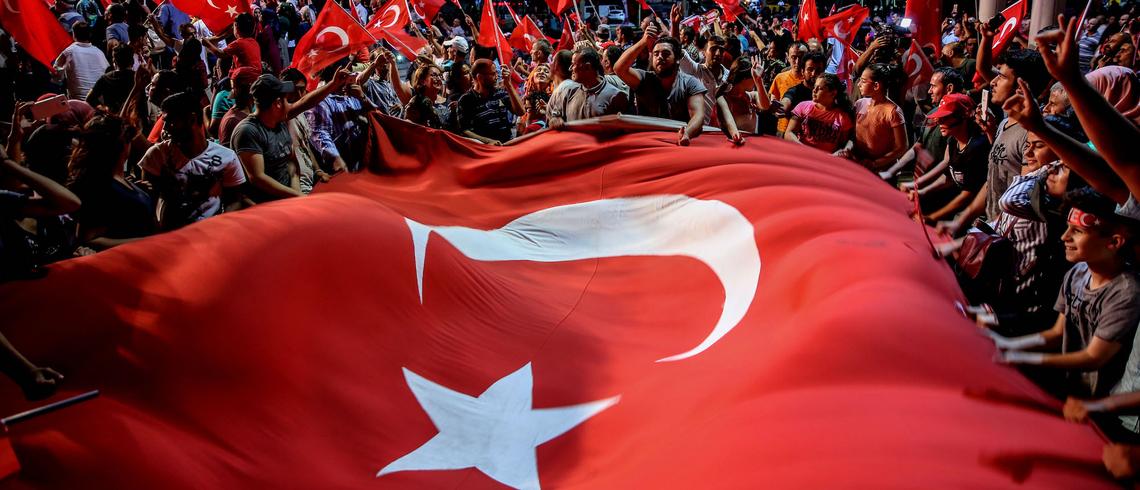It is important to remember the sacrifices of those who stood in the way of the FETO coup plotters to save their country’s democracy.
As the Turkish people celebrate six years since the failed 2016 coup attempt, it is important to remember why July 15 is being observed as Democracy and National Unity Day and why it was such a turning point in Türkiye’s history.
On a night of defiance six years ago, millions of citizens took to the streets and risked their lives to protect Türkiye’s democracy and elected President Recep Tayyip Erdogan in the face of a failed coup perpetrated by the Fetullah Terrorist Organisation (FETO).
It marked the first time in the republic’s history that a military takeover failed due to civilian resistance – and democracy triumphed.
In the process of standing up to a group of armed soldiers loyal to FETO, 251 people – most of them civilians – were killed and at least 2,700 were injured.
That Friday, the FETO plot to overthrow the government saw attacks on the Parliament, the presidency, security forces, air bases and civilians. Two bridges on the Istanbul Strait were barricaded by tanks and heavy weaponry.
But after Erdogan called on people to take to the streets, thousands came out armed with nothing but their courage. Dozens were killed on the 15 July Martyrs Bridge – with chilling images of coup soldiers shooting at people and using tanks to run them over.
The attacks continued into the next morning, as the deafening sounds of F-16's whizzed over the skies of Istanbul and Ankara. The putschists also targeted President Erdogan, who managed to escape unscathed from what many considered to be an assassination or kidnapping attempt.
In the end, it was the resolve of the Turkish people which ultimately prevailed against a traitorous group of soldiers that sought to overthrow a democratically elected government.
Talha Kose wrote in Daily Sabah of what was at stake had the coup been successful: “If the Turkish people didn’t resist the coup attempt, the societal fragmentation, the collapse of the Turkish state apparatus, mostly likely civil war, increased terrorist activities within Türkiye’s borders and illegal occupation of some regions of the Turkish border could have been quite possible.”
In the weeks following the failed coup, Turkish prosecutors gathered evidence confirming the involvement of FETO and its US-based cult leader Fetullah Gulen. The terror organisation was accused of a long-running campaign to overthrow the state through the infiltration of institutions, particularly the military, police and judiciary.
Meanwhile, many of Türkiye’s western allies did not immediately condemn the coup plot nor provide strong support for the government, something which the Turkish leadership did not forget.
Despite being presented with all the evidence to start legal proceedings, the US, where Gulen continues to be based, did little to investigate him and his vast network of businesses.
The Turkish people’s victory on July 15 also carried deeper significance with it. Marred by a history of coups, what transpired in 2016 was a firm rebuke to a regime of military tutelage since 1960.
The military coup of 1960 saw the overthrow of Adnan Menderes, the country’s first democratically-elected prime minister and his government, followed by Menderes's execution by the junta in 1961. In 1980, a coup was led by then-Chief of Staff General Kenan Evren and lasted three years.
It was that weight of history coupled with a popular will to say never again that led hundreds of thousands of people from all ages and political backgrounds to valiantly fill the streets and prevent an assault on their democracy in the summer of 2016.
Since then, July 15 has come to symbolise a victory for those who believe in a democratic Türkiye – and an inspiration for millions who looked to Turkish democracy as a shining example in the Muslim world.
Social media is bold.
Social media is young.
Social media raises questions.
Social media is not satisfied with an answer.
Social media looks at the big picture.
Social media is interested in every detail.
social media is curious.
Social media is free.
Social media is irreplaceable.
But never irrelevant.
Social media is you.
(With input from news agency language)
If you like this story, share it with a friend!
We are a non-profit organization. Help us financially to keep our journalism free from government and corporate pressure














0 Comments